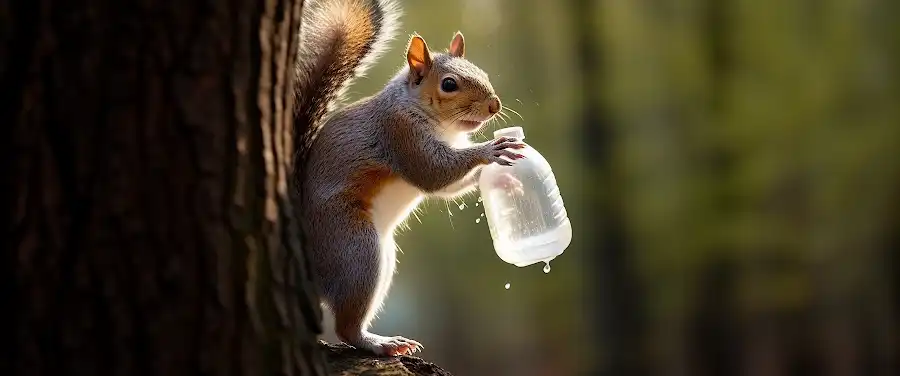
Have you ever had an adorable little squirrel nibble through your freshly planted bulbs or ruin your bird feeders’ contents? And while you’re shaking your head in frustration, they sit there with their innocent eyes, eating away merrily. Simple as it is, this tale represents a larger issue many people face daily – a squirrel infestation. Squirrels, cute as they may be, can turn into a real nuisance when they decide to make your yard their personal pantry.
To deal effectively with these energetic invaders, it’s crucial to understand squirrel behavior. As the old saying goes, “Keep your friends close and your enemies closer.” The more you know about these prancing pests, the better you can discourage them from wreaking havoc in your garden. Conscious awareness of their habits, likes, dislikes, and instincts can work wonders in keeping these critters at bay.
This is where squirrel repellents come into play and could be a lifesaver. These aren’t magical potions that would guarantee a squirrel-free yard overnight. But, with patience and consistent use, they can significantly reduce squirrel presence and associated damages. Of course, every situation is unique, so you need to pick the right one that suits your specific circumstances. Now, let us ponder upon the complex world of squirrels and why they can be troublesome.
What are Squirrel Repellents and How They Work?

Squirrel Repellents are substances designed to deter these small, energetic creatures from entering your property or consuming your plants and birdseed. They come in a variety of forms, such as sprays, granules, and electronic devices. Squirrel repellents work by making the area less attractive to squirrels, either by using scents that the animals find repugnant, or by providing them with an unpleasant tactile sensation.
Typically, once a squirrel comes in contact with a repellent, its interest is dissuaded, encouraging the creature to seek out less unpleasant surroundings. These deterrents come in two main types: natural and synthetic repellents. While both serve the same purpose, the mode of action and respective advantages vary.
How do Synthetic Squirrel Repellents Work?
On the other hand, synthetic squirrel repellents are typically stronger and last longer than their natural counterparts. These repellents primarily use the active ingredients such as Thiram or Bitrex, substances that cause a bitter taste or irritation when ingested or touched.
The potency and longevity of synthetic repellents make them an attractive option for those who are dealing with a significant squirrel problem. However, they’re not without their potential downsides. When using synthetic repellents, it’s important to consider the environmental impact and potential harm they might cause to non-target animals or kids in the household.
When it comes to effectiveness, natural and synthetic squirrel repellents can both play a part in keeping these pesky animals at bay. A 2017 study from Michigan State University found that a combination of repellents might be the most effective method in preventing squirrel damage.
Regardless of which type you choose, it’s clear that repellents can play a crucial role in managing squirrels. Before choosing a product, it’s important to consider your specific circumstances, the local squirrel population, and the extent of the problem. Next we’ll take a close look at ” How to Choose the Right Squirrel Repellent?” to ensure you make the best decision for your situation.
How do Natural Squirrel Repellents Work?
To further our understanding, let’s delve into natural repellents. These typically employ ingredients found in nature that squirrels find unattractive. Some commonly used ingredients include capsaicin (the compound that gives chili peppers their heat), garlic, and essential oils—like peppermint and rosemary.
These fragrant substances deliver an unpleasant sensory experience to the squirrel, convincing it to steer clear of the area. Natural squirrel repellents can be an effective, eco-friendly solution, but their limitations lie in the duration of their effectiveness. They often need frequent reapplication, especially after heavy rain.
Still, according to the National Pesticide Information Center, natural repellents can be effective at deterring wildlife when used in moderation and paired with other measures.
How to Choose the Right Squirrel Repellent?

Whether squirrels are invading your attic, munching on your garden produce or causing havoc in your outdoor spaces, you need an effective solution to put an end to this menace. Choosing the ideal squirrel repellent becomes a necessity. But how do you select the right one? This article will enlighten you on the factors to consider, tips on analyzing environment and squirrel behavior, and striking a balance between effectiveness and safety. Your quest for choosing squirrel repellents just got easier.
Firstly, understand the behavior of the squirrels invading your space. Observing their feeding habits, the time they are most active and their favorite spots will guide you in choosing a repellent that targets these areas effectively. Remember that what works in one case might not work in another due to differences in squirrel species and their respective behaviors.
When choosing a repellent, remember to consider its safety profile. The ideal product should not only deter squirrels but also ensure that pets and children are not exposed to harmful chemicals. Check the product labels for active ingredients and do some research on their possible effects on humans and pets. Striking an effective balance between effectiveness and safety should always be a priority.
Always consider the environmental impact of the squirrel repellents you use. Opt for environmentally friendly options that will not harm the ecosystem. Research from University of California Statewide Integrated Pest Management Program recommends prioritizing repellents that are biodegradable and have low toxicity levels to non-target organisms.
Are Homemade Squirrel Repellents Effective?
Are you considering a DIY approach to repel squirrels? Let’s break down the popular homemade squirrel repellent recipes and evaluate their effectiveness and practicality. You will also learn the limitations and understand when homemade remedies might not be enough.
Some popular homemade squirrel repellents include spicy aromas, garlic mixtures, and vinegar sprays. While they may deter squirrels temporarily, their effectiveness is often subject to debate. A reason for this is that many homemade remedies are diluted and tend to wear off quickly, requiring frequent reapplication.
On the other hand, some people swear by these remedies. For example, a hot pepper spray concoction is touted for its ability to irritate squirrels’ sense of smell and taste, thereby deterring them. Still, you may need to use these in conjunction with other repellents or measures for the maximum effect.
However, be mindful of the limitations of homemade repellents. These drawbacks are amplified when their use is matched against resilient or large squirrel populations, where more potent commercially available effectiveness of homemade repellents may be required.
Choosing the right squirrel repellent requires a thorough understanding of the problem at hand, considering environmental factors, safeguarding the health and safety of family and pets, and assessing the situation’s severity. If you’re struggling with a squirrel problem, sometimes an economical homemade solution could suffice. Other times, you might need to up your game with more a effective commercial repellent.
As we transition to the next topic, we’ll tackle how to maximize the effectiveness of your chosen squirrel repellents for best results. Stay tuned!
Conclusion
As we bring this discussion on the use of squirrel repellents to a close, it’s clear that managing squirrels in our homes and gardens is essential. These cute but destructive creatures have a knack for causing havoc in your space when left unchecked. But remember, our squirrel control efforts need to strike a balance between keeping squirrels at bay and conserving our wildlife.
Taking practical steps in dealing with squirrel infestation doesn’t have to be daunting. We’ve looked at various measures, like store-bought solutions and DIY repellents, from which you can make an informed choice based on what fits your circumstances. However, remember that consistency is key in these efforts. Squirrels are persistent, and it will take a while before they can completely abandon your home or garden as their food haven.
In summary, squirrels can be a nuisance, but with the right squirrel repellents, you can keep these unsolicited guests away. It’s important to apply these squirrel control measures consistently and persistently. With time, your home and garden will become less attractive to these creatures.
However, let’s remind ourselves of the importance of wildlife conservation. Squirrels, like other animals, play a crucial role in our ecosystem. It’s thus our responsibility to ensure we strive for a balance between keeping squirrels away from our homes and preserving them in their natural habitat.
| Type of Repellent | Estimated Effectiveness | Duration of Effectiveness | Safety for Other Wildlife |
|---|---|---|---|
| Commercial Sonic Devices | Moderate | Varies – Monthly Reassessment Recommended | Yes |
| Natural Squirrel Repellents (e.g., Cayenne Pepper) | Low – Moderate | Requires Regular Application | Depends on Repellent |
| Commercial Chemical Repellent Sprays | High | Few Weeks to a few months – Depends on Brand and Application | Read Labels Carefully, Some May Affect Non-Target Species |
Remember, the squirrel problem can be intense, but the situation is not hopeless. Armed with an arsenal of squirrel repellents and the right information, you can take back control and enjoy the tranquility of your space. After all, life is all about harmony. Here’s to peaceful coexistence with our furry friends!




